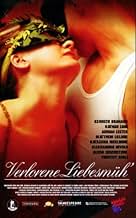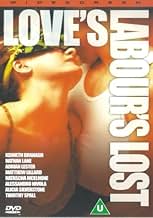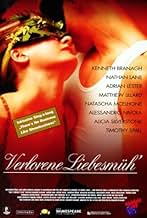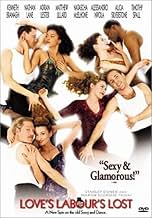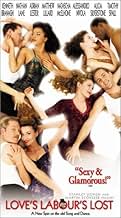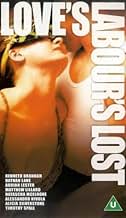Ajouter une intrigue dans votre langueAn update of the classic Shakespeare story, director Kenneth Branagh shot the film like a classic 1930s musical. It tells the story of four best friends who swear off love.An update of the classic Shakespeare story, director Kenneth Branagh shot the film like a classic 1930s musical. It tells the story of four best friends who swear off love.An update of the classic Shakespeare story, director Kenneth Branagh shot the film like a classic 1930s musical. It tells the story of four best friends who swear off love.
- Réalisation
- Scénario
- Casting principal
- Récompenses
- 1 victoire et 2 nominations au total
Avis à la une
Thus saith the critics. The forest that they're missing with their shrubs of discontentment is the overwhelming charm and infectuous fun of this silly little film. Yes, when Branagh and his cronies do a dance number it isn't lock-step choreography (one arm a little high, perhaps, one foot off the beat a bit). When Alicia Silverstone and her ladies-in-waiting cavort and giggle in a pool, they're not quite Esther Williams and company. Instead of picture-perfect Fred & Ginger, they look like real people dancing and singing because dancing and singing are fun. And unless you're Ebenezer Scrooge, The Grinch, or a movie critic, you'll have fun, too.
That's not to say the movie is just sloppy silliness. Branagh stages some gorgeous set pieces, including gondolas lit by Japanese lanterns, a prop-plane goodbye straight out of Casablanca, and a production number in which the film's silliest character kicks the moon like a big silver soccer ball. It's about a third Shakespeare, a third 30's musical, and a third Looney Tunes. What's odd is that the styles mix so well under Branagh's direction.
If you want a picture-perfect musical, rent "The Unsinkable Molly Brown" or some other dull thing. If you want perfect Shakespeare, rent Branagh's "Hamlet." If, however, you want a movie to make you believe in movies again -- if you want to kick up your heels, laugh out loud, and float out of a movie theater humming Cole Porter -- see this movie.
I was lucky enough to see this film originally at a special screening introduced by Kenneth Branagh and Alicia Silverstone, which boosted the preview audience into a higher gear of excitement and expectation than would be usual, so the experience was a little like the prospect of drinking lots of champagne –delightful, but somehow never as good as the idea of it!
Upon re-watching the film recently, I think the film in fact rather MORE resembles one of those very fancy, colourful cocktails you order when on holiday, with tiny umbrellas and exotic fruit and flowers sticking out and looking enormously tempting on the menu and when brought to you, but always somewhat impractical to drink and with ingredients that don't quite mix together satisfyingly enough. With Love's Labour's Lost the conceit of transforming Shakespeare's rich ideas into classic Hollywood musical numbers to bring across certain moods and emotional moments is a fun recipe, but it seems to me to clash too often with the actual text the film is based on. Now, admittedly much of Shakespeare's play is very obscure and difficult to understand compared to other plays he wrote, and severe editing was going to be inevitable; but putting in musical number after musical number as a replacement seems more a way of padding the film to arrive at a decent length rather than really moving the story along. In fact, many of the musical numbers –skillfully and cheekily staged though some of them are– just get in the way of things, and frequently I found myself wishing that Branagh had been even more faithful to Shakespeare and instead kept in more of the actual play itself. Thus I was pleasantly surprised to find a number of deleted scenes on the DVD of the film that sadly never made it to the final cut. I think these should have been kept in because they help make more sense of the story.
The diversity of performers that comprise the cast is quite interesting and there are some magnificent individual performances, though again the range of different styles doesn't always gel on screen. To a certain extent this was also true of Branagh's Much Ado About Nothing and Hamlet. Everyone is doing their own little film, and sometimes it works, sometimes it doesn't. Timothy Spall's Don Armado is perhaps one of the most outrageous performances ever seen on screen, but it is totally in keeping with the character as written. And both he and Nathan Lane (as Costard the clown) bring an essential element of sadness to their otherwise comic roles that is very moving. But the double quartet of lovers that form the central romantic story of the film is a very mixed bag indeed. Branagh understandably gives the plum role of Berowne to himself and sells his Shakespeare with that admirable deftness that is uniquely his, but he is really too old for the part and this works against him here. I also feel at times he should have directed himself more astutely or had better assistance at doing so, for it is largely the scenes in which he does not appear that work best –simply because at such times he, as director, is able to concentrate fully on the other performances. The film also seems unable to break itself totally free from its staginess to become the truly filmic musical it aspires to be.
So, I am quite ambivalent about this film. I DO like and enjoy it, and applaud Branagh for tackling a lesser-known Shakespeare comedy, and with such gusto, but I SO wish I were able to like it more and be fully satisfied by it –and by the greater film that is in its heart..
Having never read the play, I was quite pleased that Love's Labour's Lost was as easy to follow as it was. This has a fair amount in common with Branagh's earlier Much Ado About Nothing; mainly the highs, lows and plain ridiculousness of love. That film also featured Hollywood star casting (Keanu Reeves among others), but like that film, does not suffer from it. Indeed, it only seems to boost the feel-good nature of this film, as the actors joyfully get their collective teeth stuck into some of Shakespeare's wonderful dialogue.
What really makes this a must-see though is how the text is broken up into easily digestible chunks, interspersed with classic musical numbers from the 1930s. I wasn't prepared for how much of a joy it was to see some wonderfully romantic songs (sung pretty well actually) being put to some great dance numbers - Adrian Lester in particular was good. If, like me, you're too young to feel particularly nostalgic towards a time and genre of film that has long since gone, then I urge you to watch this and learn. And if you are old enough to yearn for those days, then do yourself a favour and go see!
Whether the concept itself is flawed is up for debate. (Surely some Shakespeare purists were up in arms when this came out!) What cannot be argued, however, is that Branagh's cast is unable to pull this off. They simply are trying to hard at what should come naturally, and the audience can't help but notice. His direction also sinks the film at various points, and as a result, the film jerks from scene to scene, from song to song, ultimately culminating in a collection of bits that never gel into a unified whole.
That's not to say that the movie doesn't have its strengths. There is a sense of fun that pervades the film which is quite pleasant. The costumes and art direction are appropriately light and beautiful, and some of the comedy moments are quite fun. Each actor also has his or her strength. Alessandro Nivola (Laurel Canyon, Mansfield Park) is the best singer, Adrian Lester (Primary Colors) the best dancer, Branagh the best actor, and Matthew Lillard (Scooby-Doo) . . . sure is tall. The supporting cast (Nathan Lane, Alicia Silverstone, Emily Mortimer, et. al.) each do their best to rise above the film's shortcomings, as well.
Ultimately, the audience ends up really trying to like this movie, but the flaws are too great to dismiss. 6/10 stars.
Le saviez-vous
- AnecdotesThe actors did their own singing.
- GaffesWhile the movie's concentrating on what is obviously WW2, one of the paper shown announces the end of the war on November 11, which is in fact the date of the end of WW1 in 1918 (the end of WW2 being on May 8, 1945 in Europe and August 15 in Asia).
- Citations
Berowne: From women's eyes this doctrine I derive: They are the ground, the books, the academes, from whence doth spring the true Promethean fire. O, we have made a vow to study, lords, and in that vow we have forsworn our books; For when would you, my liege, or you, or you in leaden contemplation have found out such fiery numbers as the prompting eyes of beauty's tutors have enriched you with? Other slow arts entirely keep the brain, and therefore, finding barren practisers, scarce show a harvest of their heavy toil; But love, first learned in a lady's eyes, lives not alone immured in the brain but with the motion of all elements courses as swift as thought in every power and gives to every power a double power, above their functions and their offices. It adds a precious seeing to the eye: A lover's eyes will gaze an eagle blind. A lover's ear will hear the lowest sound. Love's feeling is more soft and sensible than are the tender horns of cockled snails. Love's tongue proves dainty Bacchus gross in taste, for valour, is not Love a Hercules, still climbing trees in the Hesperides? Subtle as Sphinx, as sweet and musical as bright Apollo's lute, strung with his hair. And when Love speaks, the voice of all the gods make heaven drowsy with the harmony.
[begins to sing the song "Cheek to Cheek"]
Berowne: Heaven, /I'm in heaven. /And my heart beats so that I can hardly speak...
- Versions alternativesThe UK Region 2 DVD contains 5 deleted scenes:
- The boys are arguing about the girls and about breaking the vows the made.
- Moth, Constable Dull, Holofernia, Sir Nathaniel and Costard and discussing what to perform for the king, the princess and their company. They descide upon performing ^Óthe 9 worthies^Ô. Parts of this scene can be seen in the news reels.
- The third extra scene is an extended version of the scene were the girls are discussing and mocking the gifts they received from the men. The extra parts are extra dialogue for Katherine and Rosaline. Katherine tells the story of a girl who died from melancholly. Rosaline has an extended part of dialogue in which she mocks the men and Berowne specifically.
- There is a alternative scene for the masked dance scene more true to the story of Shakespeare. The boys dress up as Russians who specially came to visit the girls.
- The fifth scene is the performance of 'the 9 worthies' by the supporting characters.
- The UK Region 2 DVD does also contain various outtakes. Some of these were cut (ca. 4 seconds) to maintain the "U" rating.
- Bandes originalesI'd Rather Charleston
by George Gershwin and Desmond Carter
Performed by Kenneth Branagh, Alessandro Nivola, Matthew Lillard and Adrian Lester
Meilleurs choix
- How long is Love's Labour's Lost?Alimenté par Alexa
Détails
- Date de sortie
- Pays d’origine
- Langue
- Aussi connu sous le nom de
- Love's Labour's Lost
- Lieux de tournage
- Sociétés de production
- Voir plus de crédits d'entreprise sur IMDbPro
Box-office
- Budget
- 13 000 000 $US (estimé)
- Montant brut aux États-Unis et au Canada
- 299 792 $US
- Week-end de sortie aux États-Unis et au Canada
- 24 496 $US
- 11 juin 2000
- Montant brut mondial
- 299 792 $US
- Durée1 heure 33 minutes
- Mixage
- Rapport de forme
- 2.39 : 1
Contribuer à cette page



